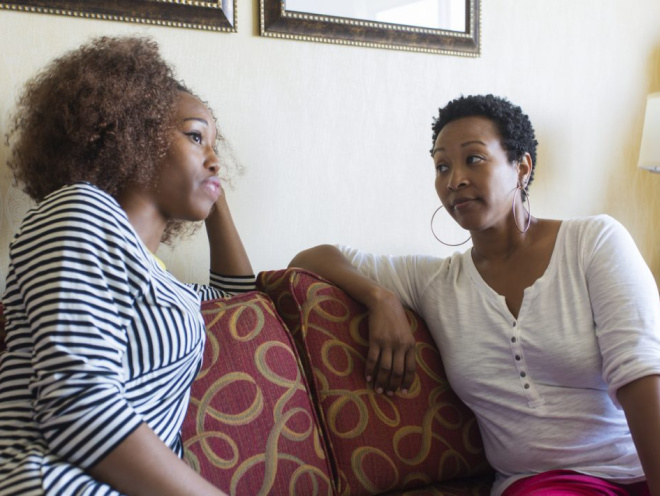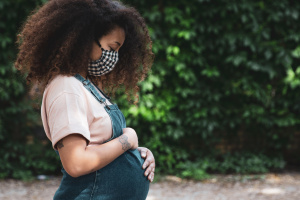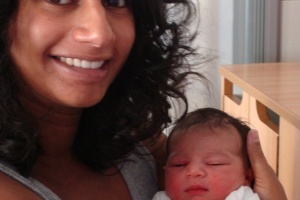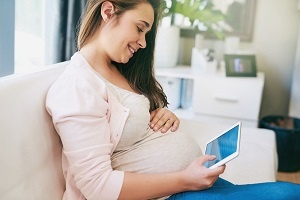If you’re pregnant and from a Black, Asian or minority ethnic background, read on to find out how to stay informed, safe and supported.
The UKOSS study in May 2020 told us more about how coronavirus affects women and their babies during pregnancy and birth. It revealed a significant and worrying fact that 55% of pregnant women admitted to hospital with coronavirus were from a Black, Asian or ethnic minority background (NPEU 2020).
Further analysis has found that black pregnant women are eight times more likely to be admitted to hospital with COVID-19, while Asian women are four times as likely (NHS 2020).
- Although the majority of people who are pregnant only experience mild symptoms and recover well, they are at increased risk of becoming very unwell with Covid-19 in the later stages of pregnancy.
- Because of this, pregnant women are strongly recommended by the RCOG and RCM to get vaccinated against Covid-19.
- The majority of women who did become severely ill were in their third trimester so social distancing measures are particularly important for this group.
- Older pregnant women, those who were overweight or obese, and pregnant women with pre-existing conditions were more likely to be admitted to hospital.
(NPEU 2020)
NHS action plan to protect pregnant Black and Asian women
As a result of this, the Royal College of Obstetricians & Gynaecologists is recommending the Covid-19 vaccination as the safest and most effective way of protecting pregnant women and their babies (RCOG, 2021). You might want to watch the video below for more information.
The NHS is also advising all maternity units across the country to take four specific actions to minimise the risk of COVID-19 for Black and Asian women and their babies:
- Increasing support for at-risk pregnant women, which includes healthcare professionals having a lower threshold to review and admit women from a Black, Asian or ethnic minority background.
- Reaching out and reassuring pregnant women from Black, Asian or ethnic minority backgrounds with tailored communications.
- Ensuring hospitals discuss vitamins, supplements and nutrition in pregnancy with all women. (Women low in vitamin D may be more vulnerable to coronavirus so women with darker skin or those who always cover their skin when outside may be at particular risk of vitamin D insufficiency.)
- Ensuring that all healthcare providers record on maternity information systems the ethnicity of every woman, as well as other risk factors, to identify those most at risk of poor outcomes.
(NHS 2020)
Staying safe if you’re Black or Asian and pregnant
Here are practical ways to protect yourself and stay safe:
- Consider having the Covid-19 vaccination. You can find out more about it here.
- Follow good hygiene practice, such as washing your hands, when you return from outside.
- Consider a face mask in crowded spaces.
- Consider Vitamin D supplements.
- Rest, sleep and exercise to help stay healthy.
- If you have hypertension, diabetes or a heart condition, talk to your GP or midwife if you have any concerns.
- If you develop more severe symptoms - a cough, breathlessness or feeling hot and shivery - or your recovery from COVID-19 is slow, please seek help.
- Attend your antenatal appointment and check-ups.
- If you are worried about your baby's movements, have any spotting or see blood in your pants, call your midwife.
- If you feel you are being treated differently or inappropriately, report and flag this within your maternity team.
RCOG 2021 and Ekechi 2020
You might also find it useful to watch Dr Christine Ekechi, RCOG spokesperson on racial equality, talk about what women should know during the pandemic:
Why are people from Black and Asian backgrounds more at risk from COVID-19?
In addition to what we now know about the impact of COVID-19 on pregnant Black and Asian women, Public Health England (PHE) also confirmed that people from black and Asian backgrounds are more likely to be affected by the coronavirus pandemic (PHE 2020, RCOG 2021).
People of Bangladeshi ethnicity had around twice the risk of death when compared to people of white British ethnicity. People of Chinese, Indian, Pakistani, other Asian, Caribbean and other black ethnicity had between 10 and 50% higher risk of death when compared to white British (PHE 2020).
Why is this the case? The answer is complicated and based on a combination of factors. People from Black and Asian communities are:
- More likely to be at increased risk because there’s a greater chance they live in urban areas, larger households and have jobs that expose them to higher risk.
- More likely than people of white British ethnicity to be born abroad. This can mean they may face additional barriers in accessing services because of cultural and language differences.
- More likely to have some health factors that could increase their risk of being more seriously affected by COVID-19.
PHE 2020
But this is definitely not the whole picture. And not the first time we have seen racial inequalities when it comes to health, and specifically maternal health outcomes.
Racial bias in how women are treated
The 2019 MBRRACE report found that black women were five times at risk of dying during childbirth compared to white women; Asian women twice as likely and mixed-race women three times as likely (MBRRACE 2019).
While the report highlighted health factors (as outlined above) for this shocking inequality, it also highlighted racial bias and racism.
"Women from Black and Asian communities spoke out about racial bias in the way they were treated during their antenatal care and birth."
Women and healthcare professionals have said that this is also a significant factor in why racial inequalities exist for ethnic groups and their health outcomes (RCOG 2020) .
Racial bias can, for instance, negatively influence diagnosis and treatment options made by healthcare professionals, such as pain management. Some women said they were not given pain relief even when they asked or needed it because of perceptions about their pain threshold based on ethnicity.
This bias can feed into a negative feedback cycle where Black, Asian, and minority ethnic women avoid interaction with healthcare professionals through fear of potential prejudice and discrimination following their experience of care (RCOG 2020).
How is racial bias being tackled?
Both the Royal College of Midwives (RCM) and Royal College of Obstetricians and Gynaecologists (RCOG) have initiatives to tackle racism and racial bias within practice and their institutions.
The theme of the RCOG’s annual conference earlier this year was ‘We need to talk about Race’. The event focused on the inequalities of health outcomes for Black and Asian women in the UK. RCOG released its position statement on racial basis outlining the challenges and its recommendations for tackling them (RCOG 2020).
"This included Government action to examine and report on racial inequality in maternity care and establish a robust training programme in medical schools to eradicate implicit racial bias and stereotypes."
The Royal College of Midwives has now developed new guidance for midwives and maternity support workers to ensure that they are aware of the increased risks for Black and Asian women and can pass on relevant advice and support to women in their care.
For instance, your maternity team may book you additional appointments, or refer you to a doctor or specialist clinic if there any concerns about your health or your baby’s (RCOG 2021).
The healthcare professionals looking after you will also advise you during appointments about higher risks that affect you. You will be encouraged and supported to seek help early if you are concerned about your health or your baby (RCOG 2021).
Reassurance and support for Black and Asian women
If you are Black or Asian and pregnant, all of these statistics might make you feel concerned or more anxious. That’s understandable. But you should also feel reassured that extra care and attention is being paid to this inequality and your care. As outlined above, the NHS has introduced an action plan to help support and protect you.
When the NHS announced the four-step action plan to make sure Black and Asian pregnant women are protected, Jacqueline Dunkley-Bent, the Chief Midwifery Officer for England, affirmed:
“While Public Health England is continuing to assess and advise on the impact of the COVID-19 outbreak on ethnic groups, I want to make sure that the NHS is doing everything we can to reach out, reassure and support those pregnant women and new mums most at risk."
Page last reviewed: 21 December 2021
Further information
The NHS website has a specific pregnancy and coronavirus page, which has all the latest information and guidance about support services.
The Royal College of Obstetricians and Gynaecologists, Royal College of Midwives and Royal College of Paediatrics and Child Health have produced information on coronavirus for pregnant women and their families. This includes information on vaccination.
You can also read our information pages on the Covid-19 vaccine during pregnancy and breastfeeding.
The Department of Health and Social Care website is being updated daily with guidance and what the government is doing about the virus.
Our support line offers practical and emotional support with feeding your baby and general enquiries for parents, members and volunteers: 0300 330 0700.
Interactive, engaging and social, our live online antenatal course is a great way for you to meet other local parents, and get essential unbiased information and knowledge about pregnancy, birth and early days with your baby.
Click on the following links for guidance on self-isolation and social distancing in Arabic, Bengali, Cantonese, French, Gujarati, Mandarin, Polish, Portuguese, Punjabi, Urdu and Welsh.
For more information about coronavirus in various languages see here.
The National Perinatal Epidemiology Unit (NPEU). 2020 Characteristics and outcomes of pregnant women hospitalised with confirmed SARS-CoV-2 infection in the UK: a national cohort study using the UK Obstetric Surveillance System (UKOSS). Available here: https://www.npeu.ox.ac.uk/ukoss/publications-ukoss [Accessed 2 June 2020]
NHS. 2020 NHS boosts support for pregnant black and ethnic minority women. Available there: https://www.england.nhs.uk/2020/06/nhs-boosts-support-for-pregnant-black-and-ethnic-minority-women/ [Accessed 29 June 2020]
Public Health England (PHE). 2020 Disparities in the risk and outcomes of COVID-19. Available here: https://assets.publishing.service.gov.uk/government/uploads/system/uploads/attachment_data/file/889195/disparities_review.pdf [Accessed 2 June 2020]
MBRRACE-UK. 2019 Saving Lives, Improving Mothers’ Care 2019. Available here: https://www.npeu.ox.ac.uk/downloads/files/mbrrace-uk/reports/MBRRACE-UK%20Maternal%20Report%202019%20-%20Lay%20Summary%20v1.0.pdf [Accessed 2 June]
RCOG. 2020 Position Statement: Racial disparities in women’s healthcare. Available here: https://www.rcog.org.uk/globalassets/documents/news/position-statements/racial-disparities-womens-healthcare-march-2020.pdf. [Accessed 2 June]
RCOG. 2021 Coronavirus infection and pregnancy: Information for pregnant women and their families. Available here: https://www.rcog.org.uk/en/guidelines-research-services/guidelines/coronavirus-pregnancy/covid-19-virus-infection-and-pregnancy/. [Accessed 21 December 2021]
Ekechi, Christine. 2020. BAME and COVID: How do I stay safe? Available here: https://www.instagram.com/p/B_4eH3hpzmX/ [Accessed 2 June]







